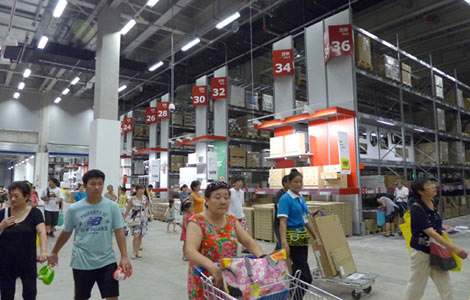HK sees boom in daily RMB settlements
Updated: 2013-10-18 23:31
By Zheng Yangpeng (China Daily)
|
||||||||
Hong Kong's daily renminbi settlement has exceeded that of the Hong Kong dollar, according to the Hong Kong Monetary Authority, underlining the yuan's increasing internationalization.
Daily renminbi settlement through the real time gross settlement systems is at nearly 400 billion yuan ($65.6 billion).
There has been explosive growth since 2009, when the cross-border yuan settlement was first allowed.
In 2010, the daily settlement value was just 5 billion yuan. But it soared to 120 billion yuan in 2011 and then to 210 billion yuan in 2012.
"The Hong Kong dollar is the official currency in Hong Kong. So this indeed is extraordinary," Norman Chan Tak-lam, chief executive of the HKMA, noted at a Friday media briefing in Beijing.
In addition, the cross-border settlement between Hong Kong and the Chinese mainland accounted for only 10 percent of the 400 billion yuan daily renminbi settlement, with 90 percent being "purely offshore", meaning most of it is occurring either between Hong Kong and overseas markets or among overseas markets via Hong Kong.
Although it was only 10 percent of the total deal volume, the cross-border trade settlement still reached 2.3 trillion yuan in the January-August period, up more than 30 percent over the same time last year.
As more and more Chinese companies conduct renminbi settlement in Hong Kong, the city's renminbi pool has grown rapidly. By the end of August, 870 billion yuan had been deposited in Hong Kong's banks.
When the city launched its offshore renminbi business four years ago, the pool was at just 60 billion yuan. That figure grew to 720 billion yuan by the end of last year, establishing the hub as the top offshore renminbi trading center.
According to the Society for Worldwide Interbank Financial Telecommunication, a global financial transaction messaging service provider, Hong Kong is involved in 80 percent of the world's renminbi settlements.
But Chan said that in coming years, Hong Kong might not maintain such a high status, as other global cities will be competing for their share.
"Many people asked me if Hong Kong is worried that more cities joined the league. My answer is no, because we expect the cake to be bigger and bigger, and Hong Kong will surely share more," Chan said.
Moreover, each offshore center could focus on its own customer base, Chan said. For example, London has an advantage in dealing with European clients.
Kelvin Lau, a senior economist with Standard Chartered Plc, said that in the longer term, both Hong Kong and Singapore could maintain their offshore yuan centers, as businesses shift from holding the yuan as a speculative investments to actually using the currency in daily operations.
For now, although individual holdings of yuan in Hong Kong have slowed due to a pause of appreciation, real corporate demand has been strong, Lau said.
Chan also disclosed that the People's Bank of China is likely to scrap the 20,000 yuan-a-day limit on currency conversion for Hong Kong residents, as the cap, which was imposed in 2004, has limited the development of Hong Kong's yuan-denominated wealth management products.
zhengyangpeng@chinadaily.com.cn
Most Viewed
Editor's Picks

|

|

|

|

|

|
Today's Top News
No secret papers for Russia, says Snowden
Stable growth 'paves way for reforms'
Chinese firm buying NY landmark
Workers' right to a rest stressed
China, EU to hold investment talks
Students asked to show poverty for grants
Mandatory student internships under fire
Shanghai to reduce PM2.5 20%
US Weekly

|

|














